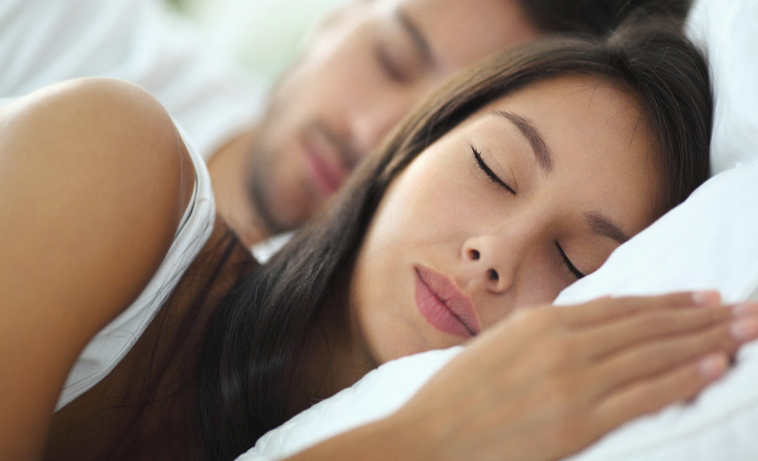What is Your Favorite Position (sleep position, that is)?

Did that title grab your attention? GREAT!
Now that I have your attention, I want to discuss a very important topic in which many of us—if not everyone—could use some improvement. It is something we all do in bed, between the sheets, but probably not for as long, as intentionally, or as healthfully as we should:
Sleep.
Most folks know that getting a good night’s sleep is important, but too few of us actually get the recommended 8 hours between the sheets—or make it a priority. It should come as no surprise that stimulants like coffee and energy drinks (even exercise), alarm clocks and cell phones, and external lights interfere with our natural sleep-wake cycle.
Yet it can’t be overstated how important sleep is when it comes to weight loss. Or how lack of sleep plays a significant role in the ability to avoid cravings. I mean, it’s true you burn more calories when awake, but not nearly enough to cancel out the many excess calories you consume (from poor choices, to boot) when exhausted.
When we don’t get the proper amount and quality of sleep, we may be prone to hormonal imbalances that can lead to irritability and mood swings, and they can really wreak havoc on your ability to control impulses.
Still need proof?
How Lack of Sleep Affects Your Health
In one study, researchers studied the sleep habits of over 1,000 participants and the effects on important hunger hormones. These scientists found that folks who slept less had lower levels of leptin and higher levels of ghrelin, a weight-management nightmare that is likely to lead to increased appetite. The authors concluded that changes in these hunger hormones as a result of lack of sleep may contribute to obesity.
In addition to weight gain, inadequate sleep can also present a number of health concerns, including headaches.
And not just any old headache, but more specifically, migraines. In one study of over 1,200 migraineurs (i.e., people who suffer from migraine headaches), researchers found that participants who routinely slept less than 6 hours each night experienced more severe headache patterns and more sleep-related headaches. This study confirms what I have known for years: I am more likely to suffer from a migraine headache if I have been deprived of sleep.
I used to blame migraine headaches on one of my children keeping me up crying, or long work hours. Come to find out, I was still experiencing these migraines even when these two factors were no longer part of the equation. In fact, scientists have now discovered that 36 to 58% of people with sleep apnea wake up with some form of headache or migraine.
It may not be surprising that depression and lack of sleep are closely related. As a matter of fact, research suggests that better sleep quality may successfully improve depressive symptoms.
According to government figures, more than half of the 18 million Americans who suffer from depression also have insomnia. While healthy sleep habits reduce the risk of depression, insomnia may increase one’s risk of depression twofold.
While chronic pain may wake you up in the middle of the night or make it hard to fall asleep in the first place, unhealthy sleep patterns may contribute to chronic pain in otherwise healthy individuals. In one study on a group of healthy males, researchers found that sleep deprivation significantly heightened the participants’ sensitivity to pain (i.e., decreased pain threshold). Incredibly, when the participants were allowed “recovery sleep,” the researchers noted that the analgesic (i.e., pain relief) effect was greater than that of common pain-relief drugs (e.g., ibuprofen, aspirin, acetaminophen).
It’s estimated that 1 in 250 Americans suffer from gastrointestinal (GI) diseases such as Inflammatory Bowel Disease (IBD) and Inflammatory Bowel Syndrome (IBS), and sleep deficiencies appear to make symptoms worse. Not surprisingly, regular sleep deprivation also appears to make one more likely to develop IBD and IBS. This correlation may be due to the fact that sleep disturbances lead to increases in inflammatory chemicals that are commonly seen in folks with GI disorders like IBD and gastroesophageal reflux (GERD).
There are more serious concerns that can be attributed to lack of sleep such as diabetes and heart disease.
More Serious Side Effects of Sleep Deprivation
We already know that insufficient sleep disrupts the metabolism and important hormones, and it also increases the risk for insulin resistance, type 2 diabetes, heart disease, and obesity. In fact, a growing body of research supports the notion that there’s a connection between sleep deprivation and the risk for obesity and diabetes, which may be due to the changes in “hunger hormones” mentioned above and the potential impact that has on overeating and weight gain.
So when you are experiencing a plateau, or perhaps think you are doing all you can in terms of dieting and exercise, yet the scale is not being favorable, it might be a good idea to take a look at your sleep—or lack thereof. Examine if you are getting adequate sleep, and if not, do something about it. Make sleep a priority, just as you do your diet and exercise.
On that note, goodnight folks… ZZZZzzzz






